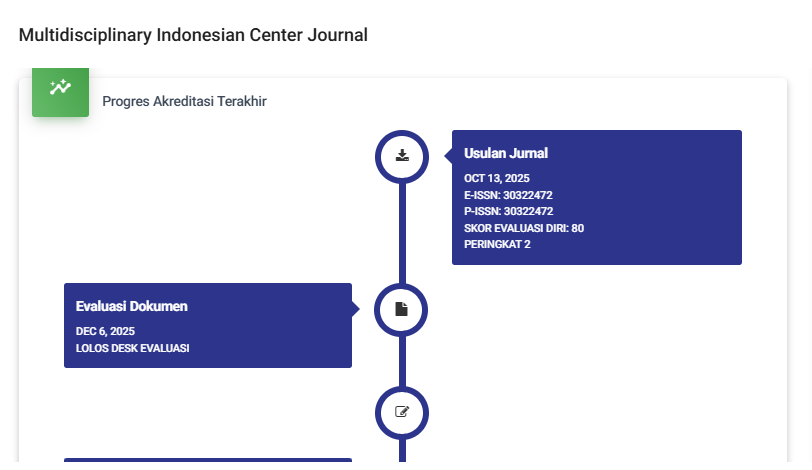DIFFERENCE IN URIC ACID TEST RESULTS USING PLAIN AND CLOT ACTIVATOR VACUTAINER TUBES
DOI:
https://doi.org/10.62567/micjo.v2i4.1416Keywords:
Uric Acid, Vacutainer Tube, Clotting TimeAbstract
Laboratory examinations play an important role in supporting disease diagnosis and treatment, one of which is the measurement of uric acid levels. The accuracy of laboratory results is significantly influenced by the pre-analytical stage, including the type of blood collection tube used. Two commonly used tubes are the plain vacutainer and the clot activator vacutainer, each with different additives that may affect blood clotting time and test results. This study aimed to determine the differences in uric acid test results and clotting time using these two types of tubes. A simple experimental method with a comparative design was conducted at Klinik Pratama Rawat Jalan Mambal Medical Care from March to April 2025. The sample consisted of 15 respondents, each undergoing two blood draws using both tube types. The results showed that the average clotting time for the clot activator tube was 9.27 minutes, while for the plain tube it was 24.67 minutes. The average uric acid level measured using the clot activator tube was 5.27 mg/dL, compared to 5.14 mg/dL using the plain tube. Statistical analysis using the Wilcoxon signed-rank test indicated a significant difference in clotting time but no significant difference in uric acid levels (p > 0.05). It can be concluded that the use of clot activator vacutainer tubes accelerates the blood clotting process but does not significantly affect uric acid levels compared to plain tubes.
Downloads
References
Agung, A., Cahyani, A. E., & Parwati, A. (2022). Manajemen Pengambilan Dan Pengelolaan Spesimen Darah Di Laboratorium Rsud Wangaya Denpasar. Surabaya : The Journal Of Muhamadiyah Medical Laboratory Technologist, 5(5), 187–194.
Amanatullah, M. R., Haiti, M., & Hutabarat, S. H. (2025). Kadar Asam Urat Menggunakan Tabung Vacutainer Plain Dan Tabung Vacutainer Serum Separator Dengan Chemistry Analyzer Uric Acid Levels Using Tubes Plain Vacutainer Serum And Vacutainer Tube Separator With Chemistry Analyzer. 24(1). Https://Jurnal.Fk.Uisu.Ac.Id/Index.Php/Ibnusina
Apriansyah, M. (2020). Pengaruh Perbedaan Variasi Volume Darah Dalam Tabung Vacutainer K3edta Terhadap Pemeriksaan Hematokrit (Hct).
Djohan, H., Dyah, Putri, Y., Kamilla, L., Tumpuk, S., Kesehatan, J. A., & Pontianak, K. (2023). Perbedaan Penggunaan Tabung Vacutainer Plain Dan Clot Activator Terhadap Waktu Pemeriksaan Gula Darah Puasa Di Rumah Sakit Sultan Syarif Mohamad Alkadrie. 6(2), 44–48.
Fitriani, R. (2021). Hubungan Pola Makan Dengan Kadar Asam Urat (Gout Artritis) Pada Usia Dewasa 35-49 Tahun.
Hayati, E., Yusup, N. T. F., Durachim, A., & Noviar, G. (2023). Pengaruh Waktu Simpan Darah Dan Jenis Tabung Terhadap Nilai Trombosit. Jurnal Kesehatan Siliwangi, 4(1), 8–14. Https://Doi.Org/10.34011/Jks.V4i1.1448
Kurniawan, R., & Kartinah, K. (2023). Gambaran Kadar Asam Urat Pada Lansia. Journal Of Telenursing (Joting), 5(1), 632–640. Https://Doi.Org/10.31539/Joting.V5i1.5749
Prasetyaningrum, E., & Amalia, Y. (2018). Pengaruh Pola Hidup Terhadap Kenaikan Asam Urat.
Purwaningsih, V., Tunjung Ellies, Widyastuti Rahma, & Sugiawan Hendri. (2020). Pengaruh Tabung Vacutainer Tutup Merah Dan Tutup Kuning Terhadap Kualitas Hasil Pemeriksaan Kadar Asam Urat Sama Dengan Comparison. Hendri Sugiawan. Http://Www.Um-Surabaya.Ac.Id
Urbaningrum, V., Karlina Hale, L., Setiawati, L., Lillah, L., Akhir, Mh., & Widya Nusantara Palu, U. (2023). Pemeriksaan Kadar Asam Urat Di Dusun Iii Desa Daenggune Kec.Kinovaro (Vol. 1).
Downloads
Published
How to Cite
Issue
Section
License
Copyright (c) 2025 Anak Agung Gede Denny Dwi Permana, Anak Agung Ayu Eka Cahyani, Ni Luh Gede Puspita Yanti

This work is licensed under a Creative Commons Attribution-ShareAlike 4.0 International License.



























